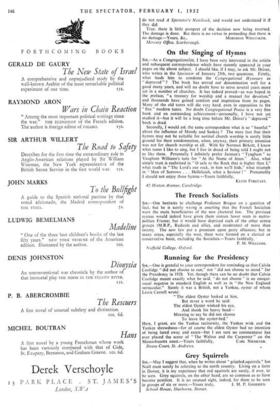On the Singing of Hymns
SIR,—As a Congregationalist, I have been very interested in the article and subsequent correspondence which have recently appeared in your pages on the above subject. I should like, if I may, to ask Mr. Driver, who writes in the Spectator of January 25th, two questions. Firstly, what leads him to condemn the Congregational Hynnzary as " depraved" ? The book has served our denomination well for a good many years, and will no doubt have to Serve several years more yet in a number of churches. It has indeed proved—as was hoped in the preface, "a treasury for worship and a manual for devotion," and thousands have gained comfort and inspiration from its pages. Many of the old tunes will die very hard, even in opposition to the "fine" modern tunes. No doubt Congregational Praise is a very fine book and an outstanding achievement—personally, I have not yet studied it—but it will be a long time before Mr. Driver's "depraved" book is dead.
Secondly, I would ask the same correspondent what is so " baneful " about the influence of Moody and Sankey ? The mere fact that their hymns may not be suitable for normal church worship is surely little pound for their condemnation, when, anyway, their primary intention was not for church worship at all. With Sir Norman Birkett, I know what tunes I like to sing, but I live in dread of being told I ought not to like them. Personally I infinitely prefer Jarman's " Tyngham " to Vaugham Williams's tune for "At the Name of Jesus." Also, what simple trust is enshrined in "0 safe to the Rock that is higher than I," what truth in" The Lord's our rock, in him we'll hide," what triumph in "Man of Sorrows . . . Halleluiah, what a Saviour ! " Presumably I should not enjoy these hymns.—Yours faithfully,


































 Previous page
Previous page